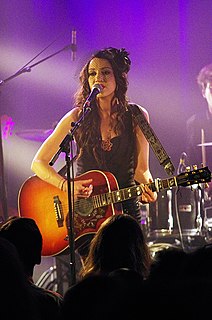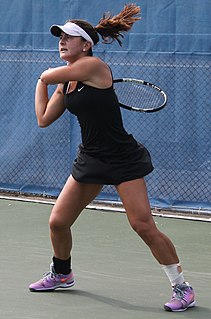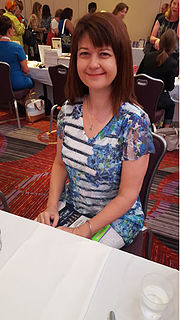A Quote by M. J. Rose
Vera Caspary wrote thrillers - but not like any other author of her time, male or female. Her specialty was a specific type that she pioneered - the psycho thriller.
Related Quotes
I read a lot by female psychoanalyst Lou Andreas-Salomé, who wrote prominent biographies of Nietzsche, Rilke, and Freud because she studied with all of them. She had this unbelievable insight into contemporary psychoanalysis. What is so interesting is that she wrote her life, and she knew that her life would be about these men, and it didn't stop her from leading an incredibly successful academic career. But her strange self-awareness that she was going to bookmark these men's lives is really interesting to me.
I got into one of the schools I applied to because of the essay I wrote about Holly Hunter's character in 'Broadcast News.' She's the only female producer on this news network, and she's really good at her job, but she allots time in her day to just sit at her desk and cry. And then she's just back to work. I find that really effective.
I'm totally into Taylor Swift. I think she has super-clever lyrics, and I love that she writes her own music. Some of the themes she writes about are stuff I wish was there for me when I was in high school, and I'm so happy she really cares about her female fans. She's not catering to a male audience and is writing music for other girls.
The song "This Is Not Surreal," was inspired by a painter I love, Frida Kahlo. She really did suffer for her art. She speaks to me. She was brutally honest in her work. At that time in fine art, you really didn't see many female artists expressing that. She was such a strong female presence, and I really look up to her. She had a lot of physical pain.
There are no words for how much I will miss her, but I try to kiss her so that she'll know. I try to kiss her to tell her the whole story of my love, the way I dreamed of her when she was dead, the way that every other girl seemed like a mirror that showed me her face. The way my skin ached for her. The way that kissing her made me feel like I was drowning and like I was being saved all at the same time. I hope she can taste all that, bittersweet, on my tongue.
In a way, her strangeness, her naiveté, her craving for the other half of her equation was the consequence of an idle imagination. Had she paints, or clay, or knew the discipline of the dance, or strings, had she anything to engage her tremendous curiosity and her gift for metaphor, she might have exchanged the restlessness and preoccupation with whim for an activity that provided her with all she yearned for. And like an artist with no art form, she became dangerous.
She expected the pain, when it came. But she gasped at its sharpness; it was not like any pain she had felt before. He kissed her and slowed and would have stopped. But she laughed, and said that this one time she would consent to hurt, and bleed, at his touch. He smiled into her neck and kissed her again and she moved with him through the pain. The pain became a warmth that grew. Grew, and stopped her breath. And took her breath and her pain and her mind away from her body, so that there was nothing but her body and his body and the light and fire they made together.
Of course at that time, especially here in America, we were dealing with women's liberation. Things weren't so easy then. Méret Oppenheim wasn't so directly involved in this - she was in her 60s at that point. She found her strength through competing with the great male artists of her time; Max Ernst and Marcel Duchamp.



































